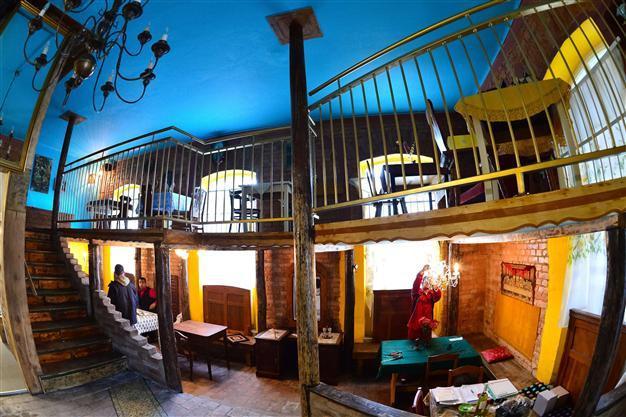Slovenia's first Roma restaurant offers hope, integration
SLOVENIA, MARIBOR- Agence France Presse

Slovenia's first Roma restaurant opened on April 12, but more than impressing food critics, it hopes to improve cohabitation with the local community and offer work opportunities to an impoverished minority. AFP PHOTO
More than impressing food critics, the Romani Kafenava (Roma coffeeshop), which opened last week in the northern city of Maribor, aims to build ties with the local community and offer hope to an impoverished minority.
"The point of this kind of social enterprise is to integrate socially vulnerable groups and teach them to work. And future customers should bear that in mind," Stefan Simoncic, head of the Epeka NGO, which backed the restaurant.
Located in a 19th-century brick building that once belonged to the Austrian-Hungarian railway company, the restaurant recruited people with little experience, most of whom had never held down a job before.
"Our waiters and cooks are not professionals, they would never get a job in a (regular) restaurant. Most of them never finished school," Simoncic noted.
Slovenia has a small Roma population of close to 10,000. But unemployment in the community stands at a massive 97 percent, compared with 13 percent for the rest of the country, the wealthiest of the former Yugoslav republics.
And many Roma -- often known as gypsies -- live in abject poverty, though with some state support.
The restaurant, which hopes to showcase Roma culture, gastronomy and hospitality, is a life line for many of its 15-member staff.
Fortune-teller after desert?At a modest opening ceremony that coincided with International Roma Day on April 8, the staff -- including six waiters dressed in burgundy and black uniforms -- eagerly waited to start serving guests for the first time after months of preparation.
"I'm very glad to have a job here," 22-year-old waiter Esad Beciri told AFP, excited like most of his colleagues at the prospect of regular work.
In a corner of the rustically decorated restaurant, fortune teller Radmila awaited customers with their cups of Turkish coffee to predict their future.
The menu promises a wide range of Balkan specialities with a Roma twist: barbecued meat, soups, stuffed peppers and Turkish sweets like baklava or tulumba semolina doughnuts.
"The food will be excellent but prices will be reasonable. It would be insane to go for an elite public in Maribor," said Rastko Zdravkovic, the restaurant's non-Roma manager, who has more than 20 years of experience in the field.
No pork is served since most Roma here are Muslims who came from Kosovo in the 1980s, when Maribor was one of the then Yugoslavia's main industrial centres.
Dzevrija Mazreti worked in a nearby restaurant and a hotel before she was hired as a cook at Romani Kafenava, but her main experience was cooking for weddings and funerals.
"You know, we never order catering, we cook it ourselves and for quite a bunch of people," said the cheerful, squarely built woman.
"We've come a long way and I assure you we'll all give 100 percent to succeed," added Fatmir Beciri, a Roma community representative.
At an early stage of the project, non-Romas in the neighbourhood near central Maribor opposed the restaurant and even sent anonymous threats. Protests in November almost succeeded in blocking the whole project.
"But many of them have changed their minds and have come to apologise," Fatmir Beciri said. "We Roma, we forgive and forget."
Romani Kafenava's success in Maribor, which has one of Slovenia's highest unemployment rates, could open the way for similar restaurants in the eurozone country and elsewhere, its organisers hope.
"We will succeed, we have to," Mazreti said confidently.
